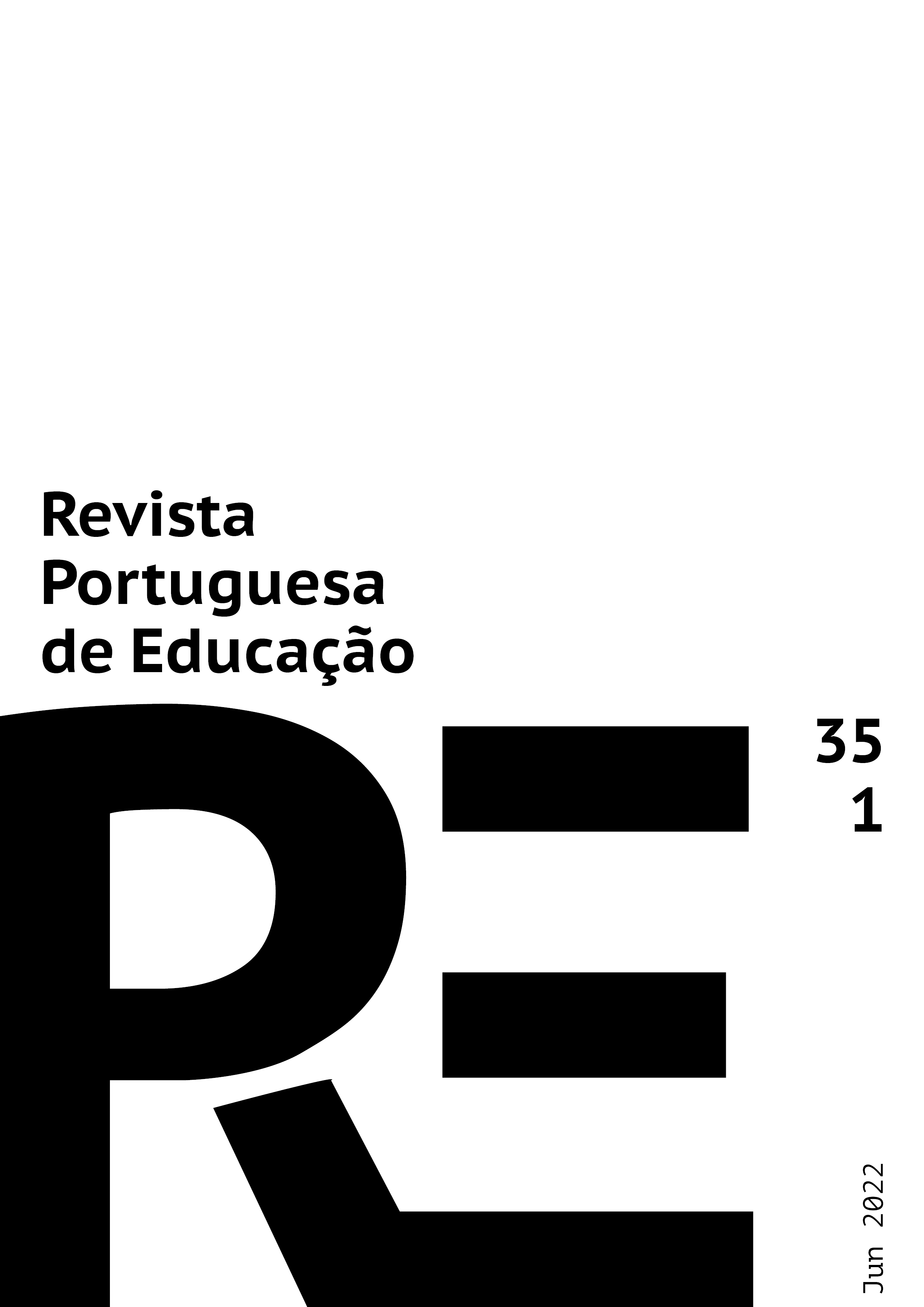Relação das habilidades auditivas e linguísticas com a aprendizagem: O olhar do professor
DOI :
https://doi.org/10.21814/rpe.20795Mots-clés :
Aprendizagem, Linguagem, Audição, Fonoaudiologia EducacionalRésumé
O objetivo do estudo foi investigar o conhecimento de professores da Rede Municipal de Ensino do Recife sobre a relação das habilidades auditivas e linguísticas com a aprendizagem, sobre a fonoaudiologia educacional e o perfil de formação dos professores dos primeiros anos da escolarização básica do Brasil. Trata-se de um estudo exploratório quantitativo e qualitativo, realizado com 488 professores que lecionam na rede pública de ensino do município de Recife/PE/Brasil. Os dados foram recolhidos por meio de um questionário estruturado, aplicado durante encontros mensais de formação continuada para professores. Os resultados revelaram que os professores reconhecem, de um modo geral, a importância da audição e da linguagem para a aprendizagem, embora não se sintam preparados para lidar com isso na escola e, como esperado, não possuem conhecimentos mais específicos sobre o processamento auditivo. Consequentemente, os encaminhamentos para especialistas da saúde são frequentes diante dos problemas de aprendizagem, desconsiderando as habilidades auditivas. Conclui-se que os professores reconhecem a importância do tema abordado; contudo, demonstram não ter domínio sobre a relevância das habilidades auditivas e linguísticas para a aprendizagem e para o desenvolvimento do estudante, bem como conhecimentos sobre o papel do fonoaudiólogo no âmbito escolar.
Téléchargements
Références
American Psychiatric Association. (2014). Manual diagnóstico e estatístico de transtornos mentais (5.ª ed.). Artmed.
American Speech-Language-Hearing Association. (2005). (Central) Auditory processing disorder - The role of the audiologist. American Speech-Language-Hearing Association, 1(C), 1-2. https://www.asha.org/practice-portal/clinical-topics/central-auditory-processing-disorder/
Bardin, L. (2016). Análise de conteúdo. Edições 70.
Bellis T. J., & Bellis, J. D. (2015). Central auditory processing disorders in children and adults. Handbook of Clinical Neurology, 129, 537-556. https://doi.org/10.1016/B978-0-444-62630-1.00030-5
Castro, T. G., Abs, D., & Sarriera, J. C. (2011). Análise de conteúdo em pesquisas de psicologia. Psicologia: Ciência e Profissão, 31(4), 814-825. https://doi.org/10.1590/S1414-98932011000400011
Celeste, L. C., Zanoni, G., Queiroga, B., & Alves, L. M. (2017). Mapeamento da fonoaudiologia educacional no Brasil: Formação, trabalho e experiência profissional. CoDAS, 29(1), e20160029. https://doi.org/10.1590/2317-1782/20172016029
Chiaramonte, T., & Capellini, S. (2019). Relação do perfil de erros de leitura e escrita na dislexia e dificuldades de aprendizagem. Teias, 20(58), 319-329. https://doi.org/10.12957/teias.2018.40287
Fernandes, D. M. Z., Lima, M. C. M. P., & Silva I. R. (2017). A percepção de professores de educação infantil sobre a atuação fonoaudiológica na escola. Distúrbios da Comunicação, 29(1), 86-96. https://doi.org/10.23925/2176-2724.2017v29i1p86-96
Glover, A., McCormack, J., & Smith-Tamaray, M. (2015). Collaboration between teachers and speech and language therapists: Services for primary school children with speech, language and communication needs. Child Language Teaching and Therapy, 31(3), 363-382. https://doi.org/10.1177/0265659015603779
Instituto Nacional de Estudos e Pesquisas Educacionais Anísio Teixeira. (2020). Censo da educação básica - Notas estatísticas. Censo Escolar, 32. https://download.inep.gov.br/publicacoes/institucionais/estatisticas_e_indicadores/notas_estatisticas_censo_escolar_2020.pdf
Maneira, S., & Gomes, M. J. (2017). As abordagens pedagógicas e o papel do professor de educação básica em processo de formação continuada no Brasil. Revista de Estudios e Investigación en Psicología y Educación, 06, 457-461. https://doi.org/10.17979/ reipe.2017.0.06.2486
Masuyama, P. M. K. (2015). Tecendo redes entre educação e fonoaudiologia: Formação colaborativa e práticas de ensino possíveis [Dissertação de mestrado, Faculdade de Ciências e Tecnologia da Universidade Estadual Paulista]. Repositório Institucional UNESP. https://repositorio.unesp.br/handle/11449/136075?show=full
Melo, J. K. O., Teixeira, C. F., & Queiroga, B. A. M. (2021). Conhecimento de professores sobre a fonoaudiologia educacional e sobre a relevância da comunicação para a aprendizagem. Revista CEFAC, 23(1), e6720. https://doi.org/10.1590/1982-0216/ 20212316720
Ministério da Educação. (2019). Política Nacional de Alfabetização/Secretaria de Alfabetização (PNA). Ministério da Educação/Secretaria de Alfabetização, Brasil.
Moura, T. F. O. R., & Maldonade, I. R. (2018). Visão de professores e equipe de saúde sobre a atuação da fonoaudiologia na educação infantil. Distúrbios da Comunicação, 30(3), 440-453. https://doi.org/10.23925/2176-2724.2018v30i3p-440-453
Reis, T. G., Dias, R. F., & Boscolo, C. C. (2018). Conhecimento de professores sobre processamento auditivo central pré e pós-oficina fonoaudiológica. Revista Psicopedagogia, 35(107), 129-141. http://pepsic.bvsalud.org/scielo.php?script=sci_arttext&pid=S0103-84862018000200002&lng=en&nrm=iso
Santos, B., & Capellini, S. A. (2020). Perfil do desempenho em habilidades metalinguísticas e leitura de escolares com dislexia, dificuldades e transtornos de aprendizagem. Journal of Human Growth and Development, 30(3), 371-379. http:doi.org/10.7322/jhgd.v30.11068
Souza, M. A., Passaglio, N. J. S., & Lemos, S. M. A. (2016). Alterações de linguagem e processamento auditivo: Revisão de literatura. Revista CEFAC, 18(2), 513-519. https://doi.org/10.1590/1982-0216201618216215
Zorzi, J. (2018). Programas para o desenvolvimento de habilidades cognitivas e linguísticas envolvidas na alfabetização e no aprendizado da ortografia: Propostas metodológicas. Revista Psicopedagogia, 35(108), 340-347. http://www.revistapsicopedagogia.com.br/detalhes/578/programas-para-o-desenvolvimento-de-habilidades-cognitivas-e-linguisticas-envolvidas-na-alfabetizacao-e-no-aprendizado-da-ortografia--propostas-metodo
Téléchargements
Publiée
Comment citer
Numéro
Rubrique
Licence
© Revista Portuguesa de Educação 2022

Ce travail est disponible sous licence Creative Commons Attribution - Partage dans les Mêmes Conditions 4.0 International.
1. Autores conservam os direitos de autor e concedem à revista o direito de primeira publicação, com o trabalho simultaneamente licenciado sob a Licença Creative Commons Attribution 4.0 CC-BY-SA que permite a partilha do trabalho com reconhecimento da autoria e publicação inicial nesta revista;
2. Autores e autoras têm autorização para assumir contratos adicionais separadamente para distribuição não-exclusiva da versão do trabalho publicada nesta revista (ex.: depositar em repositório institucional ou como capítulo de livro), com reconhecimento de autoria e publicação inicial nesta revista;
3. Autores e autoras têm permissão e são estimulado/as a publicar e distribuir o seu trabalho online (ex.: em repositórios institucionais ou na sua página pessoal), já que isso pode aumentar o impacto e a citação do trabalho publicado (Veja O Efeito do Acesso Livre).
Esta obra está licenciada sob uma Licença Creative Commons - Atribuição Compartilhamento pela mesma Licença Internacional 4.0





















